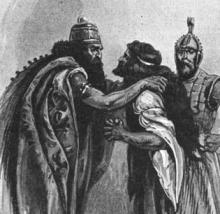Judaism is a very old faith and as such it is very concerned with cycles. The philosophies of antiquity saw a world that both constantly changed and also fell into patterns. The seasons move in a cycle, the structure of a family is nothing if not a series of rotating roles and even the biggest things in nature, like the moon and stars, seem to move in a pattern. The main thrust of Judaism is to decide which cycles to perpetuate and which ones to end. The earliest iteration of the faith grew out of a desire to end the cycle of warring civilizations toppling one god only to replace it with another. In time, this philosophy came to encompass a universal application of law rather than the caprice of powerful individuals. The Books of Samuel are a treatise on this belief of law above kings. Rather than strictly depicting a society that is made better by a proper adherence to the law, it tells the story of the cycle of destruction brought about by monarchs.
The pattern of monarchy's chaos is this: The people, choosing to shirk their responsibilities as a collective of law, invest a disproportionate amount of power in one individual because he is seen as being strong, wise or otherwise favored. That man rises to his throne by currying favor with his neighbors and defeating all opposition. Before long, he abuses his power and becomes detached from his people, creating an opportunity for dissent. New, younger, more charismatic individuals rise to oppose the sitting leader and the society is once again divided.
This is what happens when David's son Absalom returns from his self-imposed exile several years after the execution of his brother Amnon. The reasons for Absalom's decision to leave the kingdom are not explicit, but his sentiments upon his return suggest that he no longer trusts his father's judgment. When David's advisor Joab uses the kind of theatrical philosophy that usually sway's David's opinions to convince him to invite Absalom back to Jerusalem, Absalom returns and almost immediately begins undermining David's authority. He posits himself as an alternative judge, convincing people to come to him with their disputes rather than to the king. Between his good looks and his tack of coddling his would-be subjects, Absalom builds a popular base of supporters for what soon becomes a clear bid for the crown. At the slightest insult he shows incredible wrath and he devises a vast conspiracy to usurp his father's throne.
For us readers, Absalom looks unquestionably evil. But what about his people? Do they see a wicked man? For those who don't have the luxury of knowing who has divine favor, one popular leader looks very much like another. David came to power by being a charismatic political entity in opposition to the establishment twice in Israel alone. He won the popularity contest against Saul and later he won the war against Avner. In the cycle of popular monarchy, Absalom's betrayal of David is just another stage. Without an abstract constant like law, the cult of personality creates violence and treachery. This was true for those in Samuel's time and it is true for us today. When we invest too much power in individuals, it becomes next to impossible to discern who will be a good leader and who is just another careerist.
